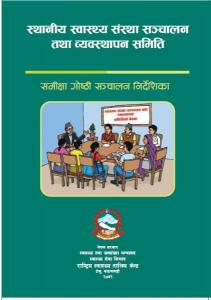Suaahara Training Guidelines and Participant Handbooks
Suaahara was a five year (2011-2016) project funded by USAID aimed to improve the nutritional status of women and children in 41 districts of Nepal. The project focused on improving health and nutrition behaviors at the household level through promotion of Essential Nutrition and Hygiene Actions (EN/HA), particularly Maternal, Infant and Young Child Nutrition (MIYCN), and addressing other determinants of under-nutrition, such as availability of and access to food, hygiene, quality of health care, child spacing and socio-cultural factors including gender and marginalization.
Suaahara was implemented by a consortium of partner organizations led by Save the Children.
The SBCC strategy established an internal quality materials review and production system to ensure that all partners in the consortium had mutually reinforcing, quality materials developed, pretested, produced and disseminated to the end user.
Suaahara developed various Facilitators Guidebooks and Participant Handbooks to support on effective implementation and monitoring of Suaahara activities. Guidebooks and participant handbooks were developed for following different training purposes as below:
- Healthy Timing and Spacing of Pregnancy Counseling training
- Orientation on Improvement of Outreach Clinic Services
- Capacity Building Training on Health Facility Operation and Management Committee (HFOMC)
- MNCH QI Toolbook
- Social Mobilization and Governance Training Guide
- PDQ Training Guideline
These guidelines/participant handbooks to be used by Suaahara staff, partner organization coordinators, field supervisors and stakeholders who is directly and indirectly involved in the Suaahara program implementation in the districts. During the activity implementation these guidelines should be followed.
NOTE: All of the guidelines are comibined into one PDF, attached to this page.
Last modified: March 25, 2019
Language: Nepali

